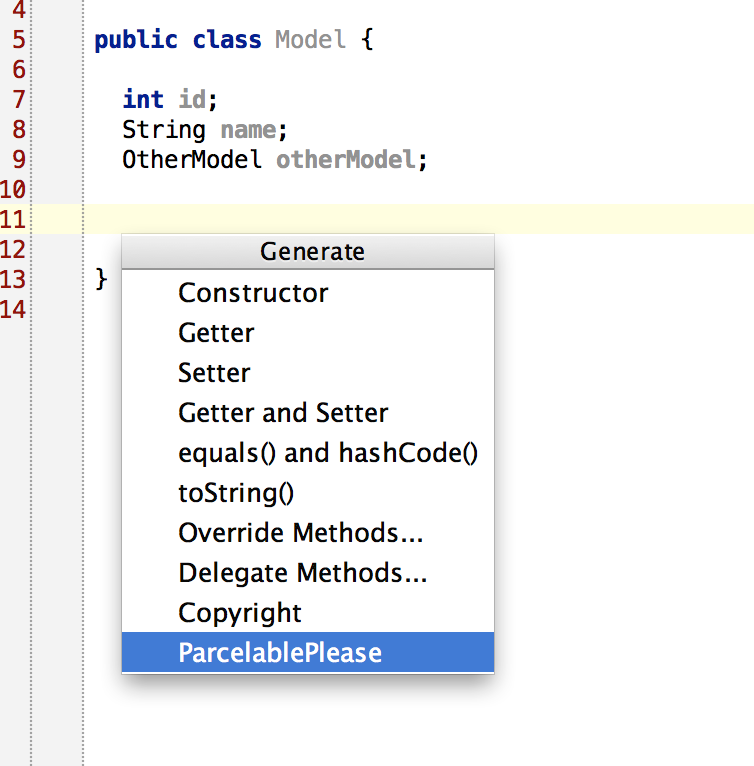ParcelablePlease
An AnnotationProcessor for generating Android Parcelable boilerplate code. See this blog entry for comparison with other parcel libraries.
Dependency
compile 'com.hannesdorfmann.parcelableplease:annotation:x.x.x' apt 'com.hannesdorfmann.parcelableplease:processor:x.x.x'In android studio you need to apply Hugo Visser's awesome android-apt gradle plugin to enable annotation processing.
How to use
Simply annotate the classes you want to make Parcelable with @ParcelablePlease and implement the Parcelable as well as the CREATOR (This step can be automated by using the Android Studio plugin, see below).
@ParcelablePlease public class Model implements Parcelable {
int id;
String name;
OtherModel otherModel;
@Override public int describeContents() {
return 0;
}
@Override public void writeToParcel(Parcel dest, int flags) {
ModelParcelablePlease.writeToParcel(this, dest, flags);
}
public static final Creator<Model> CREATOR = new Creator<Model>() {
public Model createFromParcel(Parcel source) {
Model target = new Model();
ModelParcelablePlease.readFromParcel(target, source);
return target;
}
public Model[] newArray(int size) {
return new Model[size];
}
}
;
}
The ParcelablePlease annotation processor will generate a class named ClassName + ParcelablePlease for you with all the code for writing and reading data in the Parcel. So from the example above: ModelParcelablePlease is generated and provides two static methods: ModelParcelablePlease.readFromParcel(Model, Parcel) and ModelParcelablePlease.writeToParcel(Model, Parcel, int)
Once you have done this basic setup by connecting the generated code with your Model class you can change the model class, add fields, remove fields etc. without worring about Parcelable because ParcelablePlease will generate the code for you everytime you compile.
Android Studio Plugin
Like mentioned above you have to write few lines of code to connect the Parcelable class with the generated code. Don't worry, you don't have to do this by hand. There is a Android Studio / IntelliJ plugin that can do that for you:
- Open Android Studio / IntelliJ
- Open the Preferences (on Mac with
? + ;) - Type in the searchbox "plugin" to navigate quickly to the plugins section
- Click on Browse repositories... button
- Search for ParcelablePlease and install this plugin
- Restart Android Studio
- Create a Model class and open the Generate Menu (on Mac with ``? + n` ). Note that the cursor must be somewhere in the code of the class.
Remember that you may have to compile your project to make Android Studio run annotation Processing which will generate the ParcelPlease classes.
Supported types
-
Primitives
- byte
- boolean
- double
- float
- int
- long
- String
-
Primitive wrappers
- Byte
- Boolean
- Double
- Float
- Int
- Long
-
Android specific
- Parcelable (anything that implements Parcelable)
- Bundle
- SparseBooleanArray
-
Arrays
- int[]
- long[]
- double[]
- String[]
- float[]
- char[]
- boolean[]
- byte[]
- Parcelable[] - array of anything that implements Parcelable
-
Other
- Serializable
- java.util.Date (by simpling passing time as millis)
-
Collections
- List<? extends Parcelalble>
- ArrayList<? extends Parcelable>
- LinkedList<? extends Parcelable>
- CopyOnWriteArrayList<? extends Parcelable>
- List
Bagger
Do you want to make a field Parcelable but it's not listed in the supported types list from above (i.e. java.util.Map)? No Problem: You can provide your own implementation implementing a ParcelBagger like this:
public class DateBagger implements ParcelBagger<Date> {
@Override public void write(Date value, Parcel out, int flags) {
if (value == null) {
out.writeLong(-1);
}
else {
out.writeLong(value.getTime());
}
}
@Override public Date read(Parcel in) {
long timeMillis = in.readLong();
if (timeMillis == -1) {
return null;
}
return new Date(timeMillis);
}
}
You can use your ParcelBagger with the @Bagger annotation like this:
@ParcelablePlease public class Person implements Parcelable {
int id;
String name;
@Bagger(DateBagger.class)
Date date;
}
Remember that you have to take care about special cases like what if the value is null. Note that java.util.Date is already supported by ParcelablePlease. The example above is just to give you an idea of how a implementation could look like.
Configuration
You can configure which fields should be serialized. There are two ways:
- As default all class (and super classes) fields will be serialized. You can mark field's you don't want to serialize by annotating them with
@ParcelableNoThanks - You can do the other way: You could change the settings to only serialize fields that are marked with
@ParcelableThisPleaselike this:
@ParcelablePlease( allFields = false) public class Animal implements Parcelable {
@ParcelableThisPlease
String name;
int age; // This will not be serialized
}
As default ParcelablePlease will throw a compile error if it tries to serialize private fields (private fields are not supported because of visibility issues). If your class marked with @ParcelablePlease contains private fields you could mark them as not parcelable with @ParcelableNoThanks or you could cofigure ParcelablePlease to skip private fields by using @ParcelablePlease( ignorePrivateFields = true):
@ParcelablePlease( ignorePrivateFields = true) public class Person implements Parcelable {
String name;
private int age; // No compile error
}
Limitations
- Fields must have at least default (package) visibility. That means private fields are not supported.
- Private classes are not supported because of visibilitiy issues
